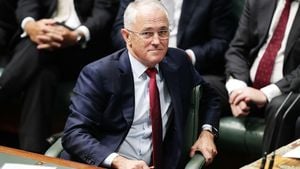Donald Trump’s stunning victory in the U.S. presidential election on November 5, 2024, set the stage for significant shifts not only within American politics but also on the international front. Analysts are drawing parallels between Trump’s triumph and Ronald Reagan’s iconic win back in 1980. Trump's return to power has stirred considerable interest, especially across Latin America, where the repercussions of his foreign policy are anticipated to be substantial.
Compared to his previous term from 2017 to 2021, Trump’s 2024 win is viewed as more momentous, particularly concerning how it impacts global relations. Winning 312 Electoral College votes against 226 for his opponent, Kamala Harris, Trump’s Republican Party also gained control of the Senate with 53 seats and is poised to strengthen its majority in the House of Representatives. This gives him not only the presidential seat but also considerable sway over American institutions, including the Supreme Court.
For many, Trump's presidency symbolizes the growing divide and polarization within American society. According to several political analysts, the dynamics within Latin America could shift dramatically under his newly regained leadership. One analyst positing this view is Brian Winter, who believes, "Latin America will probably play a more important role under Trump 2.0 than any U.S. administration in the last thirty years."
A key player within Trump’s envisioned foreign policy framework is Marco Rubio, who is set to become the next Secretary of State. Notably, he would be the first Latino to hold this influential position. Rubio, who has already begun solidifying alliances with conservative leaders across Latin America, is anticipated to play a pivotal role as he seeks to counteract China’s growing influence on the continent. He has met with leaders such as Argentina's Javier Milei and El Salvador's Nayib Bukele, highlighting his intention to strengthen diplomatic ties with the right-wing leaders of the region.
Nevertheless, Latin America is far from monolithic; it contains diverse socio-economic factors and varying political landscapes. For example, regions such as Central America and the Caribbean and the Southern Cone are fraught with issues such as organized crime and economic disparity, which must be navigated delicately. Under Trump's administration, the U.S. will likely adopt harsher positions against leftist governments, exemplified by its stances toward Nicolás Maduro in Venezuela and Miguel Díaz-Canel in Cuba.
A pressing concern for Trump will undoubtedly be Mexico, the life-blood of trade between the two countries, which exceeds $800 billion annually. His administration has expressed intentions to implement tariffs on Mexican goods to mitigate China’s influence, which could lead to detrimental effects on Mexico’s GDP according to analysts.
Trump has also made immigration and border protection cornerstones of his agenda. During his campaign, he vowed to hire 10,000 new border agents and warned of mass deportations affecting around eleven million undocumented immigrants living within the U.S. This hardline approach toward immigration will not only influence U.S.-Mexico relations but will also have significant humanitarian ramifications.
Simultaneously, as Biden prepares to exit the White House and Trump gears up to take over, the outgoing president is working overtime to preserve his foreign policy legacy. Biden’s administration has emphasized its commitment to maintaining alliances and bolstering support systems for Ukraine amid its prolonged conflict with Russia. Recently, Biden authorized Ukraine to utilize U.S.-supplied long-range missiles to strike within Russian territory—indicating the stark differences expected with Trump at the helm. During Biden's tenure, he has continued to cultivate international relationships, demonstrating strong support for Ukraine and NATO partners.
The GOP’s return to power similarly signals sweeping changes to U.S. energy policies. Increasingly, experts observe shifts at the corporate level, as seen with Hyundai Motor Co., which recently appointed Jose Munoz, its U.S. chief, as co-CEO. His promotion is strategically aligned with potential challenges stemming from Trump's anticipated policies, including elevated tariffs and proposed cuts to EV subsidies. Analysts are concerned about how these moves could impact Hyundai as it attempts to solidify its position within the highly competitive U.S. electric vehicle market.
Biden's final diplomatic efforts also included meeting with global leaders like China’s Xi Jinping, highlighting the importance of U.S.-China relations. This meeting was layered with complexity as discussions centered on China's involvement with the war in Ukraine and how it aids Russia's efforts. Analysts predict Trump might revert back to combative trade policies, including imposing high tariffs on Chinese goods, which could contribute to rising international tensions.
Despite Biden's proactive approach, his influence seems to be waning as Trump prepares to assume office. Many leaders from around the world, including Biden's allies such as French President Emmanuel Macron, have already acknowledged Trump's victory, heightening uncertainty concerning the future of international cooperation.
Little compares to the shifts expected within domestic policies, especially concerning climate action. Trump's history of skepticism toward climate change has raised alarms. Set to appoint fossil fuel executive Chris Wright as Secretary of Energy, Trump's administration is anticipated to undo much of Biden's climate legacy. During his campaigns, Trump has often dismissed climate change as "a big hoax" and is expected to withdraw from the Paris Climate Agreement once again.
John Podesta, Biden's senior climate advisor, vocalized concerns during the COP29 summit, asserting the importance of sustaining climate action at the state and local levels. The administration recognizes the fight against climate change extends far beyond any singular victory, urging for comprehensive policies to combat rising global temperatures.
Looking to navigate potential foreign policy upheaval and domestic restructuring, nations worldwide are closely observing how Trump’s election will impact international relations and economic policies. From reshuffling diplomatic alliances to advocating tough immigration policies, the ripple effects of Trump's presidency are bound to span across various global leaders and interests.
Through these transitions, the picture begins to brighten as world leaders weigh their new strategies under Trump. Will the U.S. re-engage with global partners or retreat behind its borders? What decisions will dictate the future of relations with both Latin America and beyond? Only time will reveal the paths these characters will tread on the global stage as they respond to Trump’s new era of leadership.



